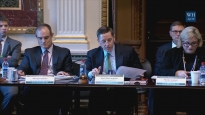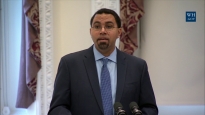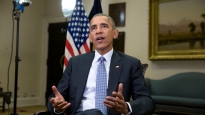The First Lady Speaks at the Working Families Summit
June 23, 2014 | 26:27 | Public Domain
First Lady Michelle Obama delivers closing remarks at the White House Summit on Working Families in Washington, D.C.
Remarks by the First Lady During Conversation with Robin Roberts at The White House Working Families Summit
The Omni Hotel
Washington, D.C.
5:36 P.M. EDT
MS. ROBERTS: Good to see you.
MRS. OBAMA: How are you?
MS. ROBERTS: Oh, doing well.
MRS. OBAMA: Doesn’t Robin look good? (Applause.)
MS. ROBERTS: Oh, thank you.
MRS. OBAMA: You look good!
MS. ROBERTS: You're just saying it because it's true. (Laughter.) But it has been, all day long here, and that lively group discussion which has preceded us, talking about the role of women in the workplace and the fact that nearly half of the workforce is made up of women. Yet when you see the Fortune 500 companies, only 24 women are CEOs. That's less than 5 percent. And like everyone, if you're involved in any type of work, you want to be in an environment where you can excel and you can grow.
MRS. OBAMA: Absolutely.
MS. ROBERTS: So what do we need to do to change that environment?
MRS. OBAMA: I think you’ve heard it all day today. We have to use our voices, particularly the young generation, because we have to realize, now that the numbers are on our side, more and more people are realizing that this is an issue for everybody. And we have to use our voices, our power and our leverage to make demands, to feel like we can make the request, to make the ask to our employers.
I mean, I had to find that voice within me, myself, and it occurred during my -- after the birth of Sasha. And Barack, I think he mentioned this. Everybody was like -- what was he talking about? Well, this is what he was talking about. (Applause.) This is what he was talking about.
I had sort of dealt with the tug of how am I balancing things. Barack was in Springfield; then he was in Washington. I was in Chicago, trying to manage these two beautiful girls, trying to still hold down a part-time job. The first thing I tried to do, which was a mistake, was that I tried the part-time thing. But what I realized was that I got gipped on that front, because when you are working a professional job, what happened was I got a part-time salary but continued to work full-time. (Applause.)
So after that experience I said never again will I short-change myself. Because we were still paying for full-time babysitting because as a professional, when there was a meeting that needed to happen they expected you to be there. So we had to have full-time babysitting. So that was a net loss for us.
Then I had Sasha and we lost our babysitter, which was probably the worst time of my motherhood. I was so devastated because that balance, that work-family balance is so fragile, and you realize how fragile it is that with a blink of an eye of a broken toilet, a sick child, a sick parent, that that balance is thrown off. And after we lost that first babysitter, someone we developed trust with, you let them in their home, they were wonderful, they loved your kid, and then they left -- and she left for good reason; she left because she needed to make more money. But it was devastating. And I said then, I quit. Just forget it. I'm not doing it again.
But I got a call from the University of Chicago Hospital; they wanted me to interview for a job. And by then I was ready to be done, but that empowered me. I said, you know, I don't even want this job, so I'm going to go to the interview and I'm just going to be whoever I'm going to be. (Laughter.) And they’re going to have to deal with it. And who I was at the time was a breast-feeding mother of a four-month old -- (applause) -- and I didn’t have a babysitter, so I promptly took Sasha to the interview with me. And I thought, look, this is who I am. I've got a husband who’s away. I've got two little babies. They are my priority. If you want me to do the job, you’ve got to pay me to do the job and you’ve got to give me flexibility.
And flexibility means that I will work my tail off for you, but you better pay me and value my family. And the guy said, of course. I thought, are you kidding? (Laughter.) And so I became a vice president at the University of Chicago Hospitals, and it was one of the best experiences that I had because they -- because he put my family first and I felt like I owed that hospital because they were supporting me.
And that's what we have to have. We have to get employers to understand that this is about their bottom line as well. (Applause.)
MS. ROBERTS: So your approach to your career changed as you became a mother, and how -- you said at first you learned not to ask for part-time, and so you were more direct in what you needed and your employer responded. There are a lot of people, though, that are going to say, yeah, but I'm at risk if I do that, I might lose my job, I really need this job.
MRS. OBAMA: That's true. That’s why it's so important for women and men who are in the position to make these demands to do it. So this isn't just -- this fight isn't about me or Barack, because things are different now. We live in the White House. (Laughter.) Grandma lives upstairs -- thank God. (Laughter.) And we have resources that we never could have imagined. So this isn't -- the fight isn't about us. It's about every mother and father out there who doesn’t have the leverage to make those demands.
We're fighting for them because we know how bad it is, we know how tough it is. I knew back then when I was a vice president at a hospital. I understood the advantage that I had. If I were a teacher or a bus driver or a nurse or a shift worker -- which my father was -- there’s no room for that kind of negotiation -- if you're an hourly worker. But the needs are even greater because the balance is even -- it's even more delicate for many working families, folks on an hourly wage.
Childcare is beyond expensive. I mean, we had the luxury of looking at nannies, right? We couldn't even afford to keep the one we had, but we weren’t looking at the cost of childcare, taking a baby, packing them up, putting them in a car-seat, dropping them off at a childcare center, coming back. Just that emotional tug on its own is powerful. And it is not lost on either me or Barack how tough it is, which is why we all have to be in this fight. This is something that we're doing for each other. (Applause.)
MS. ROBERTS: You bring up so many excellent points, and they’re so -- I know, I know, there are so many places -- but the fact that you're saying working families -- because the landscape is changing. Women are going into the workforce; there are more stay-at-home dads. Is that part of the movement and letting everybody know that it is an issue for everyone in the family?
MRS. OBAMA: Absolutely. That's why I love the fact that this is a Working Family Summit. I mean, you guys heard from Barack -- I mean, at least I heard you heard from him. What I heard that he talked about was just how important those first months that he had with the girls was. And men understand that you need that time, too. Because that bonding time, that time that he spent getting up, taking a late-night shift -- not only did it save me, gave me some sleep and some peace of mind, but he connected with our girls in a way that I still see. That connection is real. And we as mothers, we don't take that for granted.
But I think more and more men are understanding that you don't miss that time because you don't get that time back -- because, let me tell you, now that Malia and Sasha are teenagers, they don't want to be bothered with us. (Laughter.) So it's that time that you spent rocking in the chairs and reading them stories, and he was able to do that because not only did he value it, but he was in a work situation that allowed him to do that. And that brought us closer. So this is about strengthening the whole family. (Applause.)
And I think more and more men are realizing that they can't just -- they just can't pass off those responsibilities and they have to fight for these changes for themselves. This isn't a women’s issue by any stretch of imagination. (Applause.)
MS. ROBERTS: No, they realize that. And your husband really -- he was -- the things that he was saying. And one thing that really touched a lot of people is when he said, yes, you are a strong woman, a strong mother, a strong wife, but early in the marriage, to see you break down in tears because you were trying to juggle so much, and how that, after all this time, has still stayed with him. Did you? Were you in tears sometimes trying to do all --
MRS. OBAMA: Oh, my goodness. I mean, the minute those kids come into the world they just rip your heart out of your chest. (Laughter.) That's why I tell young women and young families that we grow up as professionals, many of us, and we think we have all our -- have it all figured out. We've got the plan: four years here at this university and then I'm going to go down this path, I'll earn this money and I'll get this promotion. I'm like, just have a baby. (Laughter.) And that baby comes out and looks you in the face and all the plans go out the window. You don't know how you're going to feel. And every child is different. They add a whole new set of joy, a whole new set of worries to your life. There is nothing more important to me than my girls.
That's why when we first came in and people asked me what was my agenda -- when we first came into the White House -- and I said it's making sure that my kids are whole. I thought I was being honest. (Applause.) I mean, some people judged me for that, but the truth of the matter was that whether I'm First Lady and he’s the President, our first job is to make sure that our kids are on point. (Applause.) That is the most important legacy we will ever leave. (Applause.)
So that’s why this issue is so important. Because employers have to know is -- if a family’s life isn’t right, if there’s a worry, if you don’t think that you’re leaving your child in good care, if they’re not healthy and whole and happy, you’re going to bring that worry to work. And it’s going to eat away at what you’re able to -- I don’t care what you do. You wait -- as working families, don’t you wake up every morning just praying that nobody is sick? Just don’t be sick, my God. (Laughter.) You know, we all push them out the door a little sniffly because it was like, okay, cough again. (Laughter.) No, you’re not really sick, you’re like -- it’s just -- it’s not 100! It’s not 100! (Laughter.) We all sent them to school just a little -- you’re fine, try to get through lunch. (Laughter.) Call me, tell me how you feel. But you send them off and all you’re doing is worrying that they’re falling apart in school.
So these are real emotionally draining issues. And there are -- because there are employers that have figured how to do this -- how to give us families the space to be good workers but also to first and foremost be good families, if some can do it, they call can do it.
MS. ROBERTS: Some are doing it; not all are doing it. And in part, why we’re here in Washington, people want to know the role of the federal government, and in some cases, the state government. Is that something that should be done? Because there are a lot of people who are not certain of that.
MRS. OBAMA: Well, there are two ways to focus this -- you’re going to see in this administration, they’re going to do everything in their power administratively to make changes and to lead by example. I think one of my young staffers said that she just got an email from the Chief of Staff who said because of this Summit this administration is going to start asking a set of different questions and so on. So the first thing that the President can do is make sure that his administration is leading by example.
Now, what we need to do on the policy front requires congressional action at some point in time. And I know I just heard Nancy say it and I heard the President say it, that you’ve got to have elected officials who believe in these issues and the changes that need to be made as passionately as we all do, and that’s going to require us to help them understand just how important these issues are. (Applause.)
MS. ROBERTS: But you know there are some who feel -- when we talk about minimum wage and equal pay, but mainly minimum wage -- and I think the first time we sat down and had an interview you brought it up. You were passionate about it then, and fighting, and saying how important -- and knowing the importance of that. When there are people that are there who are saying it’s going to cause jobs to be lost, it’s such a political debate. What can we do -- if we lose that debate, what can be done to push that through?
MRS. OBAMA: Well, I think building momentum. Because, again, most employers are private employers. They can make decisions based on what’s most financially expedient for them. And studies are showing that having a fair wage, having decent family leave policies and the like -- creating a flexible environment -- that that improves the bottom line for companies. And we have to start getting that information out so that every company looks at the bottom line for themselves.
The question is, is everybody even looking at it? Because if we’ve allowed this not to be an issue because we’re sucking it up, because -- and let me tell you, women, we suck it up. We’re just going to figure it out -- maybe it’s me, the reason why I feel crazy. It’s not because I should be -- we tell ourselves, I should be able to manage this, right? I should be able to have a full-time job and pick my kids up from daycare and drop them off and cook a meal and fry it up in a pan and all that stuff --
MS. ROBERTS: And never let him forget he’s a man.
MRS. OBAMA: That part, too.
MS. ROBERTS: I’m a woman! Enjoli. (Laughter.) Remember that? Enjoli, yes. (Laughter.) I’m old school, baby, I’m old school. (Laughter.)
MRS. OBAMA: Yes, yes, what Robin said. (Laughter.) But because we wind up taking these issues on, and we’re just going to do it all, right, we’re not focusing on the need to push for change.
And the 21st-century workplace, as you have pointed out, it’s very different. Women are working more, men are understanding their value as caregivers, women are primary breadwinners -- I mean, we could go on and on and on. Things are different. So we can’t keep operating like everything is the same, and that’s why many of us have done. And I think it’s up to us to change the conversation.
And this Summit hopefully is the beginning of a shift in dialogue so that, as Nancy said, as our good Speaker said, we have to change the public conversation. And we can’t underestimate the power there. You can’t just wait for politicians to do what they -- what you think they should know you want to do. They have to feel the pressure. And that’s the job of all of us, and it starts here.
But these conversations have to continue at the regional level. I know many people have been working -- absolutely. (Applause.) This is just the beginning. And it has to be a movement, and there has to be momentum, and it has to continue, and -- to the point where the pressure is to real, and that this is the conversation that we’re having at every socioeconomic level, within ever race and every community, that we are now demanding that we can have the resources to do it all -- to be good workers, to earn a decent living, and to raise our families so that they’re whole and happy and healthy. That is the American way. That is the American way. (Applause.)
MS. ROBERTS: And it was said here about how women -- there are more women that are in law school and medicine and other fields, but when it comes to the STEM fields, the one -- science, technology, engineering and mathematics -- that’s where the growth is, that’s where women can make even more money than any other field.
But yet, women, even though there’s more of us on college campuses, we’re not in those fields. And there seems to be a stigma still attached to that. How do we eradicate that?
MRS. OBAMA: Well, we have to start very early on. And more and more resources are being put into encouraging more women and girls to enter STEM fields. But as you all know, it starts very early on. You’ve got to create that pool.
Because so much of that field requires the stair-steps of math and science, and you can’t sort of skip a step because everything builds upon everything else. And so many girls shy away from math and science; they automatically say, oh, I’m not good at that. I was a victim of that. I didn’t go to medical school because I thought I wasn’t good at sciences. My mother told me I talked a lot, so I went to law school. (Laughter.)
But we’ve got to get girls when they’re young before they move away -- or sort of buy into the mythology that women can’t do these things. So we have to start very early.
MS. ROBERTS: You had said in I think it was Parade Magazine that you and your husband would like your daughters to get a minimum-wage job to build character, to understand what it’s like. What kind of job would you like -- when you say that?
MRS. OBAMA: I don’t care. Just a job that pays them. It really doesn’t matter what it is. I think the whole point is that they learn how to roll up their sleeves and work hard and understand what the vast majority of folks in this country have to do to earn a living, and that’s it’s not glamorous, and that it’s not fun all the time, and there are people who get up every day for their entire lives and go to a job that’s not fun, and they do it to put food on the table.
My father was one of those folks, one of those men. And just watching him get up every day and go to work and go to a job that didn’t -- that wasn’t exciting and glamorous, but -- to go to a job that paid the bills and sent us to college, it motivated me to never take my education or my opportunities for granted. And I want my girls to understand that firsthand. (Applause.)
MS. ROBERTS: And when you and your husband, when you leave Washington, let’s see, Malia will be in college.
MRS. OBAMA: I know. (Laughter.)
MS. ROBERTS: Sasha will be in high school. There are many people that are wondering what’s your next act? Will it be political?
MRS. OBAMA: Me?
MS. ROBERTS: Yes, you.
MRS. OBAMA: No, it will not be political. (Laughter.)
MS. ROBERTS: No?
MRS. OBAMA: Yes, no, it definitely will not be. It will be mission-based, it will be service-focused. (Applause.)
MS. ROBERTS: Not in that regard. Here we are, we’re talking -- we have Nancy Pelosi that was up here, we have women at the Supreme Court, and there are many feeling that if we’re going to talk about leadership -- and that’s what we’re doing here -- that a woman president is part of that. And what an example that would set for your girls and for young boys, and for all of us. Do you foresee that happening, and should -- and when should that happen?
MRS. OBAMA: That should happen as soon as possible. (Applause.) And, you know, I think this country is ready. This country is ready for anyone who can do the job. And what we have learned is that the person who can do the job is -- doesn’t have a particular race or gender or background or socioeconomic status. (Applause.) The person who should do the job is the person who’s the most qualified. And I think we have some options, don’t we? (Applause.)
MS. ROBERTS: You sure you’re not getting into politics? Because that answer was really good. (Laughter.)
MRS. OBAMA: I am positive. (Laughter.)
MS. ROBERTS: In the time that we have remaining, as I said, you’re the closing act. There has been a whole day of just great dialogue, and people --
MRS. OBAMA: A great day.
MS. ROBERTS: A great day. And people want to feel -- and I was talking about this, because the last time I saw you was Dr. Angelou’s service. And we had all said -- and it was up there in the chapel about how “people will forget what you said, people will forget what you did, but people will never forget how you made them feel.” And there is a sense of how people are going to feel when they leave this day, this Summit. What is it that you want them to know?
MRS. OBAMA: People should feel energized and empowered. (Applause.) And I sense that in the room today. I was backstage saying hi to some folks, and you guys were feeling it. (Laughter.) That’s a good thing. That’s the word on the street, is that this was a very uplifting day.
But this is just a day, right? And movements don’t happen in the span of 24 hours, and they take a while, which is why we want to really empower the next generation. Because the young folks coming into the workplace now are the ones who can really start pushing for a whole new type of paradigm.
But it’s going to take time, and it’s going to take persistence and consistency. And there will be bumps in the road, and there will be losses. But we have to celebrate every small victory. And we can’t be our own worst enemies and get down on ourselves because we lose a battle or we didn’t get a hundred percent of what we want. Change can be -- come in increments of 20 percent victories, but we have to celebrate those victories and keep pushing forward.
So this is just the beginning. And it has to be, because this is going to be a long road. We’re going to have to see changes in the way society perceives this issue -- that’s going to come from people in this room. We’re going to have to change the way Congress sees these issues -- that’s going to come from the people in this room. And we have to build on this movement, because it affects everyone.
This is one of those -- this should be one of those issues that galvanizes this nation. Because, again, it knows no race, no socioeconomic background, no religion. (Applause.) It’s something that we all should be able to pull around, but we’ve all -- we all have to be out there pushing this forward. And that is my hope for today, that this is just the beginning of an important conversation that’s going to continue for years and years to come until we’re finally up there with other leading nations who’ve had amazing work-family policies for a much longer time.
There’s no excuse for America to be following on this issue. We should be leading on this issue. (Applause.)
MS. ROBERTS: And picking up that, because your husband just today was talking about how this great country, that we are the only one of a developed nation that does not have a paid leave for maternity. And I think when you see that and when the President expresses that, there is a feeling that this time has come. And so what, again, when we’re going to leave here, what is it that you want us to do?
MRS. OBAMA: Vote. (Applause.) Continue to use those voices. For those of us who have the leverage to be sort of the trailblazers within our companies, we should be the ones doing it. If we have seats at the table in companies across America, if we’re sitting on boards, if we’re leading organizations, then we should be taking the lead. We should be pushing our companies. We should be taking the risks of making somebody mad, making somebody feel a little bit uncomfortable. We have to be leaders.
If we own a business, we should be trying to figure out the data and how to make it work for our bottom lines. We should be looking at the research. We should be asking those tough questions. We should be looking at best practices. We have to be leaders on this issue.
And this group is not an accident. I mean, we’ve picked the top advocates, the top business owners, the top policy makers -- you guys are the ones who are leading on this issue. But remember, trailblazing can hurt sometimes. And some of it may not feel so good, but you’re doing it for the men and women who don’t have that voice, and who can’t take the risks. (Applause.) So we have to be the ones to do it for them.
MS. ROBERTS: And you have consistently done that. Mrs. Obama, thank you very much for this opportunity to sit down with me.
MRS. OBAMA: Thank you, Robin. (Applause.)
END
6:09 P.M. EDT
|
December 7, 2016
|
December 7, 2016
|
December 7, 2016
|
December 6, 2016
|
|
December 6, 2016
|
December 5, 2016
|
December 4, 2016
|
December 3, 2016
|
- &lsaquo previous
- …
- 3
- 4
- 5
- 6
- 7
- 8
- 9
- 10
- 11
- …
- next &rsaquo







